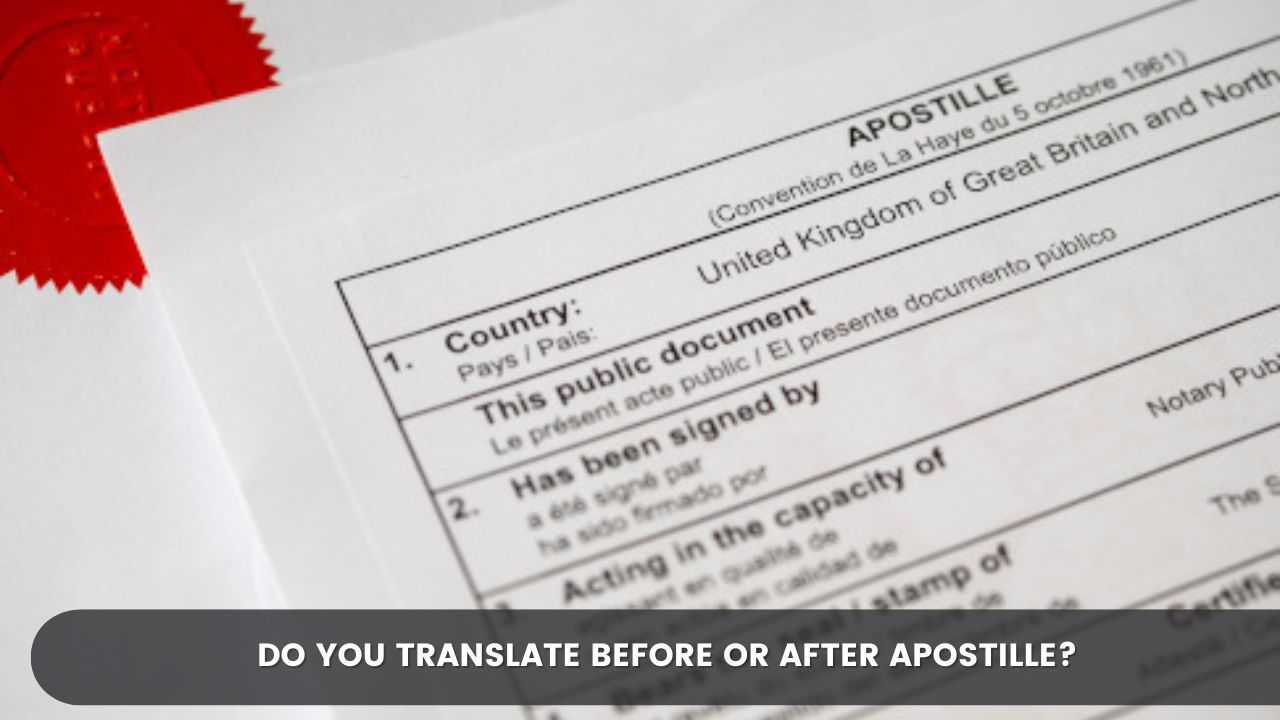Navigating the complexities of international documentation can be challenging, especially when it comes to understanding the right order of translating documents and obtaining an apostille. This article delves into whether you should translate before or after an apostille, providing a comprehensive guide to ensure your documents meet all necessary legal and linguistic requirements.
Understanding Apostille: A Basic Overview
Before diving into the translation aspect, it’s essential to understand what an apostille is. An apostille is a certification that authenticates the origin of a public document. It is issued under the Hague Convention of 1961 and simplifies the process of document validation for international use.
Key Points to Know:
- Purpose: Ensures that public documents issued in one signatory country will be recognized as valid in another.
- Documents Covered: Birth certificates, marriage licenses, diplomas, court orders, and more.
- Process: Typically involves validation by a competent authority designated by the country of issue.
Why Translation is Important
When dealing with international documentation, translation is crucial. Legal and official documents must be accurately translated to be understood and accepted in a foreign country. This translation must be precise, as any errors can lead to misunderstandings or legal issues.
| To understand the foundation of the apostille process, it’s crucial to know what an apostille certificate entails and its importance. |
Should You Translate Before or After Apostille?
The question of whether to translate before or after obtaining an apostille depends on several factors, including the type of document, the requirements of the receiving country, and practical considerations. Let’s explore these in detail.
Translating Before Apostille: Pros and Cons
Pros:
- Clarity: Ensures the document is fully understood before the apostille process.
- Uniformity: A single translation can be used for multiple countries if needed.
Cons:
- Double Processing: The apostille might need to be applied to the original document and the translation.
- Extra Costs: Potential additional costs for translating and apostilling the document separately.
Translating After Apostille: Pros and Cons
Pros:
- Single Certification: Apostille only the original document, then translate the certified document.
- Efficiency: Avoids the need for multiple apostilles.
Cons:
- Potential Miscommunication: If the translation is not done carefully, the meaning might be altered.
- Legality: Some countries require the translation to be apostilled as well.
| Before deciding on translation timing, it helps to learn why apostille attestation is needed for international documentation. |
Country-Specific Requirements
Different countries have varied requirements regarding apostille and translation. Here are some examples:
United States:
- Generally accepts documents that have been translated and then apostilled.
- Certain documents might require notarization before the apostille.
France:
- Prefers apostille on the original document before translation.
- Requires a certified translator for legal documents.
Japan:
- Often requires documents to be translated after obtaining the apostille.
- Translation must be done by a certified professional.
Practical Steps for Apostille and Translation
Step 1: Determine Document Requirements
Check the specific requirements of the receiving country regarding apostille and translation.
Step 2: Obtain Necessary Legalization
Get the original document legalized, if needed, before the apostille.
Step 3: Apostille the Original Document
Apply for the apostille from the designated authority in your country.
Step 4: Translate the Document
Use a certified translator to ensure accuracy and legal compliance.
| Knowing which countries require an apostille can guide your decision on when to translate your documents. |
Choosing a Certified Translator
Selecting a certified translator is vital for ensuring the translated document is legally valid and accurate. Look for:
- Accreditation: Certified by a recognized professional body.
- Experience: Specializes in legal document translation.
- Reputation: Positive reviews and recommendations.
Common Mistakes to Avoid
Mistake 1: Ignoring Country-Specific Rules
Always check the requirements for apostille and translation in the receiving country.
Mistake 2: Using Non-Certified Translators
Uncertified translations might not be accepted, leading to delays and extra costs.
Mistake 3: Incorrect Apostille Application
Ensure the correct document is apostilled to avoid reprocessing.
Importance of Accuracy in Translations
Accuracy in translation is paramount, especially for legal documents. An inaccurate translation can lead to legal issues, misunderstandings, and invalidation of the document.
Document Types Requiring Apostille and Translation
Personal Documents:
- Birth and death certificates
- Marriage and divorce certificates
- Adoption papers
Educational Documents:
- Diplomas and transcripts
- Academic certificates
Commercial Documents:
- Business contracts
- Patent applications
- Certificates of incorporation
The Role of Apostille in International Documentation
Apostille plays a critical role in simplifying the legalization of documents for international use. It ensures that documents are recognized as valid and authentic, facilitating smoother legal and administrative processes.
FAQs
What is an apostille?
An apostille is a certificate that authenticates the origin of a public document for international use.
Why is translation necessary for apostilled documents?
Translation ensures that the document can be understood and legally recognized in the foreign country.
Can I use any translator for translating apostilled documents?
It’s best to use a certified translator to ensure the translation is legally valid.
What happens if I translate before apostille?
Translating before apostille might require double processing, as both the original and translated documents may need to be apostilled.
Do all countries have the same requirements for apostille and translation?
No, requirements vary by country. Always check the specific requirements of the receiving country.
Is it more expensive to translate before or after apostille?
Costs can vary. Translating before apostille might incur additional costs for apostilling both the original and translated documents.
Conclusion
Deciding whether to translate before or after obtaining an apostille depends on the specific requirements of the receiving country and the type of document. By understanding these requirements and following the proper steps, you can ensure that your documents are correctly processed and legally recognized internationally. Always consult with a certified translator and legal expert to navigate this process effectively.

